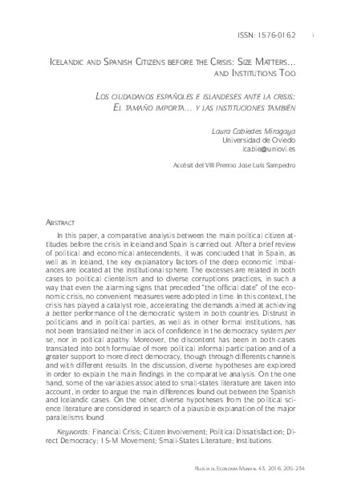Icelandic and spanish citizens before the crisis: size matters ... And institutions too = Los ciudadanos españoles e islandeses ante la crisis: el tamaño importa... y las instituciones también
Autor(es) y otros:
Fecha de publicación:
Citación:
Descripción física:
Resumen:
In this paper, a comparative analysis between the main political citizen attitudes before the crisis in Iceland and Spain is carried out. After a brief review of political and economical antecendents, it was concluded that in Spain, as well as in Iceland, the key explanatory factors of the deep economic imbalances are located at the institutional sphere. The excesses are related in both cases to political clientelism and to diverse corruptions practices, in such a way that even the alarming signs that preceded “the official date” of the economic crisis, no convenient measures were adopted in time. In this context, the crisis has played a catalyst role, accelerating the demands aimed at achieving a better performance of the democratic system in both countries. Distrust in politicians and in political parties, as well as in other formal institutions, has not been translated neither in lack of confidence in the democracy system per se, nor in poltical apathy. Moreover, the discontent has been in both cases translated into both formulae of more political informal participation and of a greater support to more direct democracy, though through differents channels and with different results. In the discussion, diverse hypotheses are explored in order to explain the main findings in the comparative analysis. On the one hand, some of the variables associated to small-states literature are taken into account, in order to argue the main differences found out between the Spanish and Icelandic cases. On the other, diverse hypotheses from the political science literature are considered in search of a plausible explanation of the major parallelisms found
In this paper, a comparative analysis between the main political citizen attitudes before the crisis in Iceland and Spain is carried out. After a brief review of political and economical antecendents, it was concluded that in Spain, as well as in Iceland, the key explanatory factors of the deep economic imbalances are located at the institutional sphere. The excesses are related in both cases to political clientelism and to diverse corruptions practices, in such a way that even the alarming signs that preceded “the official date” of the economic crisis, no convenient measures were adopted in time. In this context, the crisis has played a catalyst role, accelerating the demands aimed at achieving a better performance of the democratic system in both countries. Distrust in politicians and in political parties, as well as in other formal institutions, has not been translated neither in lack of confidence in the democracy system per se, nor in poltical apathy. Moreover, the discontent has been in both cases translated into both formulae of more political informal participation and of a greater support to more direct democracy, though through differents channels and with different results. In the discussion, diverse hypotheses are explored in order to explain the main findings in the comparative analysis. On the one hand, some of the variables associated to small-states literature are taken into account, in order to argue the main differences found out between the Spanish and Icelandic cases. On the other, diverse hypotheses from the political science literature are considered in search of a plausible explanation of the major parallelisms found
ISSN:
Colecciones
- Artículos [37544]
- Economía Aplicada [221]
Ficheros en el ítem





